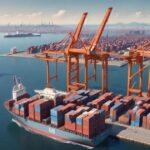Impact of tariffs on manufacturing sector: what you need to know

Anúncios
The impact of tariffs on the manufacturing sector includes protection of local industries, potential job creation, and increased costs for consumers, shaping the dynamics of international trade.
The impact of tariffs on the manufacturing sector is a crucial topic that touches on jobs, costs, and innovation. Have you ever wondered how these trade policies influence what you pay for products? Let’s dive into this complex issue.
Understanding tariffs and their purposes
Understanding tariffs is essential to grasp their impact on the economy. Tariffs are taxes imposed by a government on imported goods. Their primary aim is to protect domestic industries from foreign competition.
By increasing the cost of imports, tariffs encourage consumers to purchase locally produced products. This can lead to job creation within the country and strengthen the manufacturing sector.
Why Do Governments Use Tariffs?
Governments implement tariffs for various reasons:
- To protect emerging industries from international competition.
- To generate revenue for public funds.
- To retaliate against unfair trade practices by other countries.
These measures can have widespread repercussions, affecting prices and availability of goods. Watch how tariff policies can influence your everyday life through changes in prices and product options.
Anúncios
For more in-depth information, visit the Trade Technology website, where you can find comprehensive insights on tariffs and their effects on trade.
| Aspect | Key Point | Impact |
|---|---|---|
| Tariff Purpose | Protect domestic industries | Boosts local production |
| Domestic Benefits | Raises sales and job security | Stimulates local economy |
| Global Comparison | Varied policies across nations | Impacts global trade flow |
| Industry Case Studies | Steel, autos, tech, and farming | Price shifts and supply issues |
| Consumer Impact | Higher costs on imported goods | Raises prices for buyers |
| Retaliation | Foreign tariffs in response | Affects exports and growth |
| Future Trends | Digital trade and green focus | Shifts in global trade rules |
Effects of tariffs on domestic manufacturing
The effects of tariffs on domestic manufacturing can be profound. By imposing tariffs, governments can make imported goods more expensive, which can boost local production.
This protectionism may work in favor of domestic manufacturers, making their products more competitive in the market.
Potential Benefits of Tariffs
Here are some benefits that tariffs can bring to domestic industries:
- Increased sales for local businesses due to less competition.
- Greater job security for workers in the manufacturing sector.
- Encouraged investment in local production facilities.
However, it’s important to note that the impact of tariffs is not solely positive. While some industries may thrive, others might face challenges due to higher material costs or retaliatory tariffs.
To understand more about the economic implications of tariffs, visit the U.S. Department of Commerce’s website for authoritative insights on trade policies.
Comparative analysis of tariff impacts globally

A comparative analysis of tariff impacts globally reveals significant differences in how various countries address trade policies. Tariffs can shape economic landscapes, influencing everything from consumer prices to international relations.
Countries with high tariffs may protect their industries, but this can lead to trade tensions and retaliation from other nations.
Key Differences in Tariff Policies
When looking at global tariffs, consider the following:
- Developed nations often have different strategies compared to developing countries.
- Some countries utilize tariff-free trade agreements to promote globalization.
- Response to trade wars can vary, affecting local economies differently.
Understanding these dynamics is crucial for businesses and policymakers. For authoritative information on global trade policies, visit the World Trade Organization website.
Case studies of industries affected by tariffs
Case studies of industries affected by tariffs highlight how these policies can dramatically alter market dynamics. Various sectors experience distinct impacts, which provide insight into the broader effects of trade policies.
For example, the steel industry has seen significant changes due to tariffs imposed to protect domestic production.
Industries Affected by Tariffs
Here are some notable case studies:
- Automotive Sector: Tariffs on imported vehicles can increase prices for consumers, which may lead to a decrease in sales and slower production rates.
- Agriculture: Farmers often face higher prices for imported goods, impacting their profit margins and competitiveness in global markets.
- Technology: Increased tariffs on electronics can lead to higher costs for consumers and disrupt supply chains.
Each industry has unique challenges and benefits when tariffs are applied. For further in-depth analysis, visit the U.S. Citizenship and Immigration Services website for valuable resources on trade effects.
Future trends in tariff-related policies
The future trends in tariff-related policies indicate that governments will continue to adapt their approaches based on global economic changes. As trade relationships evolve, so do the strategies used to manage tariffs.
Countries are increasingly focusing on balance, trying to protect their industries while promoting international trade.
Emerging Trends in Tariff Policies
Consider the following trends:
- Increased digital trade agreements: Governments are recognizing the need for policies that address the rise of e-commerce.
- Focus on sustainability: Many tariffs may shift towards promoting green technologies and environmental standards.
- Retaliatory measures: Expect ongoing trade tensions to influence how tariffs are implemented in response to foreign policies.
As these trends develop, they will significantly impact businesses and consumers alike. For more detailed insights on future trade policies, check out the U.S. Trade Administration for their latest reports and updates.
In summary, understanding tariffs and their impact is crucial
Tariffs play a vital role in shaping the manufacturing sector and the economy as a whole. As we have explored, they can protect local industries while also leading to challenges such as increased costs for consumers.
With emerging trends in tariff policies and their effects on global trade, it’s essential for businesses and consumers to stay informed. Keeping an eye on how trade agreements evolve can help you navigate future challenges effectively.
As tariffs continue to shift, recognizing their potential benefits and drawbacks will equip you to make better decisions in your personal and professional life.





